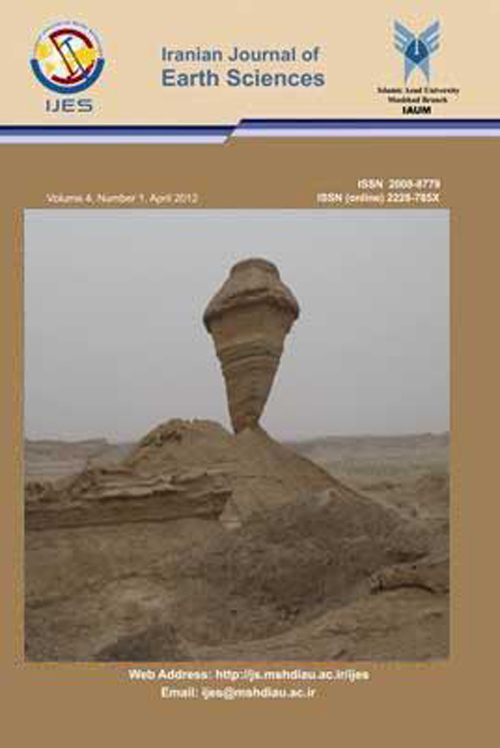فهرست مطالب

Iranian Journal of Earth Sciences
Volume:5 Issue: 1, Apr 2013
- تاریخ انتشار: 1392/06/26
- تعداد عناوین: 5
-
Pages 1-12Kahang Cu Porphyry deposit is situated in the central part of a major Iranian magmatic belt, Urumieh-Dokhtar, in central Iran.There are several sub-volcanic stocks (e.g., porphyric granitoids rocks, quartz monzonite, diorite and monzodiorite-monzogranite)within Eocene volcanic and pyroclastic rocks consisting of basaltic, trachy-andesite and dacitic rocks. Hydrothermal alterations at the Kahang deposit have an extended range and exhibit a concentric zoning pattern including potassic, phyllic, argillic and propylitic from the center to the margin. The aim of this study was to identify geochemical particulars by geochemical applications in 184 rock samples in these potassic, phyllic and argillic alteration zones. The results of this study show that there are high values of K, Mg and Cu in the potassic zone (located in the central part), main Mo anomalous parts and high Cu values can be found in the phyllic zone (eastern part), and high values of Au, Ti and Al are concentrated in the argillic zone (western part). Overall, the Kahang deposit hosts Cu, Mo and Au mineralization in these three zonesKeywords: Hydrothermal Alteration, Lithogeochemical Data, Cu Porphyry Deposit, Kahang, Iran
-
Pages 13-20Groundwater, being a vital resource, needs to be developed with proper understanding about its occurrence in time and space. Unscientific sand mining is a dominant environmental issue in this humid tropical river basin namely Bharathapuzha river basin geographically on central part of Kerala state, southwest part of India. The sandy layers along the river course declines its water holding capacity due to indiscriminate sand mining throughout the river basin. For a sustainable development of water resources, it is imperative to make a quantitative estimation of the available water resources. The purpose of the study is to identify the groundwater potential zones in the Bharathapuzha river basin in Kerala state, India based on Remote Sensing and GIS technology. Thematic layers considered in the study are geomorphology, land use, and lineament derived from IRS P6 LISS IV digital data; drainage network contour and slope maps are generated using toposheets; geology from GSI geology maps, with the help of Arc GIS Software and Erdas Software. Storativity and transmissivity of the study area was prepared using pumping test data. The thematic layers were over layered by weighted overlay method using Arc GIS. Four groundwater potential zones were identified in the study area represented as very good, good, moderate and poor potential zones.Keywords: Geospatial Approach, Thematic Maps, Overlay Analysis, Groundwater Potential Zones, Humid Tropical River Basin
-
Pages 21-24In the present research synthesis of zeolites, merlinoite minerals of natural clinoptiloite mineral in the presence of alkaline mediums, was investigated. The analyzed variants are a result of a concentration of Na+ and K+ ions, temperature and time. Phase transition of clinoptiloite was conducted in the presence of an 8 molar potash solution (KOH) and a 4 molar soda solution (NaOH). Results indicated that merlinoite phase occurs at a temperature of 200 degrees centigrade and the presence of highly concentrated ions of Na+. With the passage of reaction time, the concentration of the synthesized merlinoite is increased accordingly. XRD studies suggest orthorhombic synchrony with the dimensions of c = 9.45 Aº, a = 14/12 Aº, d = 2/19 Aº, n = 1/494 Aº for merlinoite.Keywords: Clinoptiloite, Alkaline Solution, Merilonite, Orthorombic
-
Pages 25-32The Mighan Playa is the largest playa in Markazi Province. Sedimentary and soil structures show that during all phases the playa was ephemeral. The duration and frequency of flooding varied causing variations in the relative amounts of accumulation, and soil formation. The clastic fraction of the playa sediment consists of quartz, mica and chlorite while the non-clastic evaporite fraction is dominated by gypsum, calcite, glauberite, thenardite and halite. Using the principle of chemical divides, such variations in mineralogy have been explained in terms of a change in brine chemistry from Na-Ca-Mg-SO4-Cl to Na-SO4-Cl type. It is also suggested that at an earlier stage, Mighan playa brine underwent evaporation under the conditions of Ca>alkalinity whereas in more recent times, the evaporite mineralogy has developed with alkalinity>Ca. The shallow depth cores are divided into distinct geochemical units based on elemental ratios. Units I and III reflect high chemical weathering whereas the middle unit, II, indicates relatively low weathering and enrichment in evaporatesKeywords: Mighan Playa, Sedimentary Facies, Evaporites, Geochemical Unit
-
Pages 33-40DT log is one of the most frequently used wireline logs to determine compression wave velocity. This log is commonly used to gain insight into the elastic and petrophysical parameters of reservoir rocks. Acquisition of DT log is، however، a very expensive and time consuming task. Thus prediction of this log by any means can be a great help by decreasing the amount of money that needs to be allocated for acquisition. Support vector machine (SVM) is one of the best artificial intelligence techniques proven to be a reliable method in the prediction of various real world problems. The aim of this paper is to use SVM to predict the DT log data of a well located in the southern oilfields of Iran. By comparing the results of SVM with those obtained by a Back Propagation Neural Network (BPNN) we were able to verify the accuracy of SVM in the prediction of P-wave velocity. Hence، this method is recommended as a cost effective tool in the prediction of P- wave velocityKeywords: Prediction, DT Wireline Log, Back Propagation Neural Network, Support Vector Machine, Southern Oil Field

